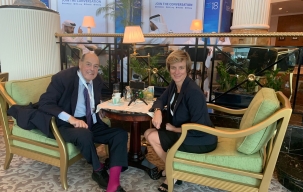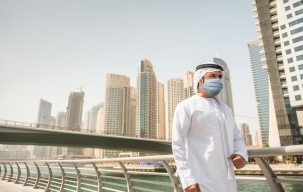
Bahrain (BH)
Capital
Manama
Population
1.64 million
Constitution
Constitutional monarchy
Head of state
H.M King Hamad bin Isa Al Khalifa
Head of government
HRH Prime Minister & Crown Prince Salman bin Hamad Al Khalifa
National Day
December 16th
Bahrain's Ambassador to the UK
H.E Sheikh Fawaz bin Mohamed Al Khalifa
Embassy of the Kingdom of Bahrain, 30 Belgrave Square, London, SW1x 8QB
UK's Ambassador to Bahrain
H.E Mr Alastair Long
British Embassy Manama, 21 Government Avenue, Manama 306, PO Box 114 Manama, Bahrain
Bahrain is an archipelago located in the Persian Gulf. Its name means “two seas” in Arabic. Bahrain Island is the archipelago’s largest while Muharraq Island is the second largest and home to Bahrain International Airport.
Island nation and important western ally
So, Bahrain is an island nation off the coast of Saudi Arabia, connected to it by the Kind Fahd Causeway. It is also home to a UK and a US naval base, which have both been crucial to the military presence and naval operations of both of these important Bahraini western allies in the region.
Government
The Kingdom of Bahrain is a constitutional monarchy. Since the late 1700s, the Al-Khalifa family has ruled Bahrain, which had previously been under the rule of the Portuguese, and, before them, the Persians and the Ancient Greeks. During the 19th century, Bahrain entered into various treaty agreements. It was a British protectorate until its full independence in 1971.
The ruling family is Sunni, although the current consensus opinion is that there is probably a small Shia majority in Bahrain. In truth, no one really knows the exact current ratio between Sunni and Shia. Some unofficial sources say it could be approximately 45% Sunni to 55% Shia. Other sources have even claimed that there is a small Sunni majority. However, whatever the figure, it is an issue which has caused a degree of tension within the country. It is a factor that has, on occasion, fuelled public protest and civil disobedience, as was shown to have been the case in the early stages of the so-called Arab Spring of 2011.
Religious tolerance
Bahrain is widely recognised as an example of minority religious tolerance in the Gulf. While Islam is still the majority religion, 9.3% of the population is Christian with 16.9% representing other faiths.
Bahrain is home to the biggest Roman Catholic Cathedral in the region, the Our Lady of Arabia, built in Awali south of Manama on 9,000 square metres of land bequeathed by King Hamad to the Holy See. The cathedral first opened its doors in 2021.
While the population includes a small number of Jews (0.1%) there are notable examples of Jewish Bahrainis in positions of influence, including female Jewish politicians, and a historic synagogue which has recently seen some of its first services for over a century.
Pearls to oil
For millennia, up until the 19th century, Bahrain was known principally for its pearl trade, and then, through the 20th Century, it gained its wealth through the oil industry. It has since become one of the first Gulf states to diversify its economy in order to reduce its reliance on oil. Currently, Bahrain produces around 200,000 barrels per day, accounting for some 80 percent of state revenues.
Recent oil strike
As oil reserves dwindled in the latter half of the 20th century, the nation became an early leader in the region of sectors like the processing and refinement of petroleum and aluminium production. Its economic diversification also encompassed areas such as tourism and the increasingly important field of Islamic finance.
In late 2017, Bahrain discovered highly significant quantities of oil and gas off-shore, thought to be the biggest strike since 1932, which are apparently set to dwarf the Kingdom's current supplies.
Carbon neutral by 2060
Climate change is impelling Bahrain and other Gulf countries to diversify their economies. Bahrain plans to be carbon neutral by 2060. The Kingdom plans to adopt a circular carbon economy strengthened by various offsetting schemes including carbon-capture technology and afforestation.
Constitutional reform
Bahrain moved to have more representation in government in the beginning of the century, with the establishment of a constitutional monarchy in 2002, and the appointment of the first women and non-Muslims to the council. The Chief of State is the monarch.
The Prime Minister and cabinet are appointed by the monarch. Bahrain’s legislative branch is the National Assembly which is made up of the Consultative Council, a 40-seat council with appointed members, and the Council of Representatives which holds 40 elected members who must win absolute majority in their single seats. Representatives in the Council of Representatives serve four-year terms and can be re-elected.
Abraham Accords
In September 2020, Bahrain and the United Arab Emirates signed a normalisation agreement together with Israel called the Abraham Accords. Subsequently, Bahrain and Israel have opened embassies in each other's countries. In December 2020, the trio were joined by Morocco.


